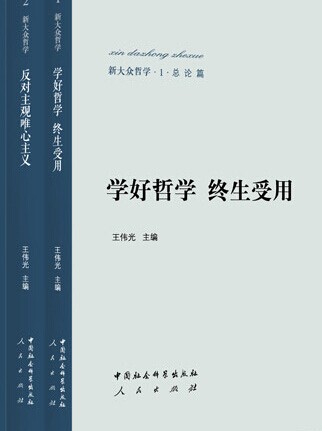Marxist philosophy vital to socialist undertaking

New Public Philosophy
Editor: Wang Weiguang
Publisher: People’s Publishing
The New Public Philosophy has been published at the exact right time. It points out 300 major theoretical and practical problems in the contemporary era while providing incisive and persuasive answers from the perspective of Marxist philosophy.
The book, which does not confine itself to traditional philosophy, focuses on problems and conducts analysis and discussion from various perspectives, such as pandect, materialism, dialectics and epistemology, while integrating concepts of history, values and life that embody the quintessence of the Sinicization, modernization and popularization of Marxism.
The publication of New Public Philosophy comes at a crucial moment when the socialist cause with Chinese characteristics stands at a new starting point in history. National reform has been comprehensively deepened, and the Chinese people are moving under the guidance of the CPC toward the objectives of the “Two Centuries” strategy. It will necessarily play a proper role in transforming great mental power into strong material force.
At present, the critical economic, political, cultural, social and ecological issues involved in the construction and reform of the Chinese civilization and the Party have presented dilemmas, which require us to resort to dialectical materialism that presents everything as two conflicting aspects. The mechanisms established during these reforms are subsystems of the complicated national governance system. And we need to abide by the law when conducting reforms and set up systematic, coherent and coordinated mechanisms, the process of which relies on the guidance of dialectical materialism and historical materialism. It is evident that Marxist philosophy does not become outdated but grows increasingly relevant with time, and its Sinicization does not come to a halt but progresses at a higher speed.
The book also comes at a critical moment when the whole Party is seriously studying the important speeches by General Secretary Xi Jinping, seeking common understanding and uniting all forces to advance the cause of socialism with Chinese characteristics and realize the Chinese dream of national rejuvenation. Thus, it will play an important role in strengthening and innovating ideological and theoretical education.
At the same time, the CPC is implementing the “mass line” campaign while cultivating and practicing core socialist values. In such a context, the book will play an active role in strengthening ideals and beliefs, promoting righteousness and improving social conducts under the Party leadership.
I believe that the book will capture scholars’ attention at the rank-and-file level and change their styles of work and writing. This will lead to the generation of more and better intellectual products, ushering in a great boom for Chinese philosophy and social science.
Li Jie is the proprieter of Qiushi periodical office.
The Chinese version appeared in Chinese Social Sciences Today, No. 653, Oct. 8, 2014.
Translated by Ren Jingyun

 PRINT
PRINT CLOSE
CLOSE